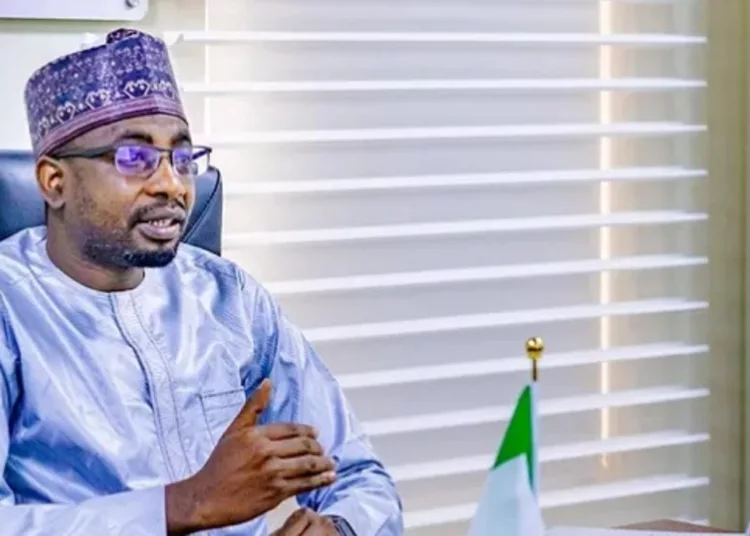The National Information Technology Development Agency (NITDA) has reaffirmed its commitment to promoting the digital economy agenda in the country.
Nigeria’s digital journey is at the forefront of this unprecedented growth of the National Information Technology Development Agency (NITDA) and one of its key strengths lies in its collaborative approach and partnerships with major industry stakeholders, technological hubs, educational institutions building a robust digital ecosystem through strategic partnerships.
Lead strategist and director general, Kashifu Inuwa Abdullahi, in a statement reiterated the need for a safe and inclusive online environment responsible for human and Artificial Intelligence (AI) and its practices in the country.
He highlighted that we are planning to host TikTok lately, which aligns with President Bola Ahmed Tinubu’s priority area of strengthening national security for peace and prosperity; the director general stated that content moderation strategies will help in addressing online problems like hate speech, misinformation and cyberbullying in relation to the protection of minors across the country.
He stated that “With the Code of Practice for Interactive Computer Service Platforms/Internet Intermediaries in place, it will ensure digital safety in accordance with global best practices and content moderation to enhance safety.”
Also, the executive secretary, Citizens Watch Advocacy Initiative (CWAI), Omoba Kenneth Aigbegbele, emphasises that NITDA’s partnerships span across various sectors and this multifaceted approach ensures a comprehensive strategy for digital economic innovation in the country.
He said, among the critical areas of focus are training programmes in Artificial Intelligence (AI), Coding, Cybersecurity, and basic digital literacy.
These initiatives are not just about imparting knowledge, they are also about equipping Nigerians also with skills necessary to thrive in a digital economy.
“NITDA’s involvement in developing guidelines for AI and data protection, which are crucial as the world increasingly relies on data-driven decision making. These regulations not only protect users, but also provide a clear framework for companies to innovate confidently. The statement also captures the need that these targets and plans are needed to stimulate timelines and achieve targets crucial for Nigeria to develop a digital system that is efficient, modern economies that enhance business operations, smart public services and job creation for the teeming youths of the country.”
He maintained that NITDA is pushing and leveraging the narratives of Africa to the world where creators are being equipped with information that are centred on creating contents for products and services, and thus can be exported to other countries, attracting investments and also providing the opportunities where Nigerians can use AI, cybersecurity and online platforms to market, sell and export their services as well as talents to the outside world and also making a living from it.”
CWAI considers online safety as one critical area to secure the cyberspace by providing an avenue for users to thrive and be productive in their various activities as CWAI revealed that NITDA is one of its biggest and critical stakeholder in Nigeria that has an outstanding strides and performance in advancing the digital economy sector by partnering with both government and private sector leaders to develop sustainable, secure, safe and inclusive communities powered by ethical and innovative technology solutions.
He emphasised that “What we want to do is to make sure that we leverage technology to bring the right level of economic opportunity to Nigeria that will contribute towards economic growth and job creation.”
NITDA is birthing a new generation of highly skilled talented Nigerians as Tech hubs across the country are buzzing with activity, where participants are immersed in learning experiences that cover the latest advancement in technology, the educational institutions and the Federal Ministry of Education are critical to these endeavours to integrate these programmes into their curricular to produce graduates that are ready to meet the demands of the digital age.
CWAI also reiterates that beyond the educational sector and training, NITDA’s role includes the co-creation of policies that create a conducive environment for tech startups and established companies alike by setting standards and regulations to ensure that innovation flourishes while maintaining the integrity and security of the digital infrastructure.
The lead strategist of NITDA believes that “Nigeria is poised to surpass India in technological exploits, highlighting the nation’s potential to become a leading power house in the tech ecosystem.”
He added that, “With our youthful population, growing innovation hubs and supportive government policies, Nigeria is on the brink of a tech revolution,” stressing that, “We have a potential to outpace countries like India if we leverage our resources effectively.”
Accordingly, Nigeria boasts of a population of over 200 million, with more than 60 per cent under the age of 25. This demographic advantage presents a fertile ground for tech innovations. Young Nigerians are increasingly showing prowess in various domains from software development to Artificial Intelligence (AI) and Fintech.
CWAI agrees that Nigerian youths are not just consumers of technology but creators and innovators. As the D-G aptly captures it, “We are witnessing a surge in tech startups, many of which are developing solutions tailored to local challenges with global scalability.” He added that, “This burgeoning talent pool is evident in the success of Nigerian tech entrepreneurs and developers who are gaining recognition on the international stage.”
“As regards the government’s support and policy framework, NITDA has been proactive in creating a conducive environment for tech growth. Initiatives such as the National Digital Economy Policy and Strategy (NDEPS) and the Start-up Act aim at driving digital transformation and support to start-up ecosystem: “Government policies are increasingly geared towards reducing barriers for tech entrepreneurs; that government is focusing on improving digital infrastructure, providing fiscal incentives and enhancing digital literacy across the country.” He added that these efforts are designed to make Nigeria an attractive destination for tech investment and promotion.”





